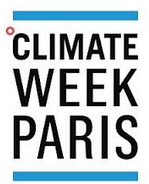 22 May 2015: Planned 200 days in advance of the 21st session of the Conference of the Parties (COP 21) to the UNFCCC, Climate Week Paris highlighted that “climate action makes good business sense.” Business leaders, policymakers and non-governmental organizations (NGOs) alike confirmed that a strong global climate change agreement, to be adopted at COP 21, will be a critical signal to the private sector to scale up their low-carbon activities.
22 May 2015: Planned 200 days in advance of the 21st session of the Conference of the Parties (COP 21) to the UNFCCC, Climate Week Paris highlighted that “climate action makes good business sense.” Business leaders, policymakers and non-governmental organizations (NGOs) alike confirmed that a strong global climate change agreement, to be adopted at COP 21, will be a critical signal to the private sector to scale up their low-carbon activities.
During Climate Week Paris, held from 18-22 May 2015, private, public and non-profit organizations hosted roundtables, forums, panels and exhibitions, encouraging countries to commit to ambitious action on climate change, put in place predictable, long-term climate-smart policies and invest in the transition to a low-carbon economy.
On 19 May, the Low Carbon Technology Partnerships initiative (LCTPi), working groups met to continue preparing action plans for deploying and scaling up low-carbon technology and business solutions consistent with the 2˚C objective, which will be presented at COP 21. LCTPi maintains that “ambitious climate action is the biggest opportunity for your business.” LCTPi is a project of the World Business Council for Sustainable Development (WBCSD), the Sustainable Development Solutions Network (SDSN) and the International Energy Agency (IEA).
Also on 19 May, investors launched the online ‘Investor Platform for Climate Actions,’ which will track the global investor community’s response to climate change. Actions will be recorded in three areas: measurement (e.g. carbon footprinting of portfolios); engagement (e.g. with fossil fuel and energy intensive companies); and reallocation (including investment in low-carbon assets and shifting capital from emissions-intensive activities). The coalition of investor groups coordinating the platform note that its launch follows a call for a strong global climate deal at the UN Climate Summit on 23 September 2014 by over 360 investors managing over $24 trillion in assets.
The Science Based Targets Initiative, a partnership of CDP, UN Global Compact, the World Resources Institute (WRI) and WWF, hosted an event titled ‘Mind the Science – Why Businesses Are Aligning Their Goals with the Planet’ on 20 May 2015. The Initiative launched the report, ‘Mind the Science,’ which explains how some companies are currently setting their greenhouse gas (GHG) emission reduction targets. The event also launched a methodology developed by the Initiative for setting science-based corporate GHG targets, called the Sectoral Decarbonization Approach. In addition, Science Based Targets launched a campaign to recruit 100 companies by the end of 2015 to set GHG emission reduction targets in line with climate science.
During its event on 20 May 2015, titled ‘Facing Climate Change: Turning Urban Challenges into Opportunities,’ the UN Environment Programme (UNEP) presented the initiative, ‘ABC of Sustainable Cities,’ which will be officially launched at COP 21. The publication, which is currently being prepared by UNEP and the International Federation of Consulting Engineers (FIDIC), will be a living glossary aimed at clarifying “broadly used terms and words in order to further support a common understanding and promotion of sustainable cities as well as the implementation of related sound policies.”
An informal policy dialogue organized jointly on 22 May 2015 by the International Centre for Trade and Sustainable Development (ICTSD) and the Organisation for Economic Co-operation and Development (OECD) explored the concept of “carbon market clubs,” which could contribute to a successful bottom-up approach to the anticipated 2015 global climate change agreement. Panelists argued that such clubs could function in parallel to, though outside of, the UNFCCC process, while a global carbon market is still out of reach under the UNFCCC. They would facilitate participation of those parties willing, especially when climate action is driven by national governments, as reflected in the intended nationally determined contribution (INDC) process in preparation for negotiating an agreement. In addition, incentives for those in a club, according to the organizers, would encourage greater participation.
Climate Week Paris was organized by the Climate Group, which has organized Climate Week NYC for the past seven years. In addition to the various activities hosted throughout the week, Climate Week Paris featured two cornerstone events, the Business & Climate Summit on 20-21 May 2015, and Climate Finance Day on 22 May 2015. [IISD RS Story on Business & Climate Summit] [IISD RS Story on Climate Finance Day] [IISD RS Story on OECD Green Investment Financing Forum] [IISD RS Story on Sustainable Innovation Forum 2015] [IISD RS Story on Science Based Targets Initiative] [Climate Week Paris Website] [LCTPi Website] [Investor Platform for Climate Actions Website] [Investor Platform for Climate Actions Press Release] [Science Based Targets Event Webpage] [Science Based Targets Press Release] [Science Based Targets Blog Post] [Mind the Science] [Sectoral Decarbonization Approach (SDC): A Method for Setting Corporate Emission Reduction Targets in Line with Climate Science] [UN Global Compact Press Release] [FIDIC and UNEP Event Webpage] [ICTSD and OECD Event Webpage]